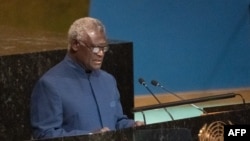Solomon Islands Prime Minister Manasseh Sogavare said Friday he has assured Australia that his nation will not allow a Chinese military presence in its territory.
The island nation has been at the center of a diplomatic tussle in the southern Pacific Ocean between the United States, Australia and their allies on one side and an increasingly assertive China on the other.
Australian Prime Minister Anthony Albanese met Sogavare in Canberra on Thursday to smooth ties that have been frayed since the Solomons signed a security pact with Beijing this year -- a move that sparked fears of Chinese military presence in the region.
"About China, this is a sensitive issue we discussed, and I assured Australia when I met with Anthony Albanese yesterday that we will not allow such to happen," Sogavare said in a written reply to questions sent by AFP.
Previously, however, Sogavare has said that China would be permitted to build wharves and airports -- which could be useful for both civilian and military purposes.
Solomon Islands switched diplomatic recognition from Taipei to Beijing in 2019 and signed its security pact with China earlier this year.
Last year in November, violent demonstrations broke out in the Solomons capital Honiara, sparked in part by China's growing influence in the country but also fueled by poverty and inter-island rivalries.
Much of Honiara's Chinatown was torched.
Further such riots were "highly unlikely," Sogavare told AFP, saying his government had put in place measures to control any violence.
The Solomons-Australia relationship has been strained in recent months.
Canberra in September offered to help Solomon Islands fund its upcoming national elections -- an offer Sogavare initially condemned but later accepted.
The Solomon Islands government has been sensitive to criticism of its ties to China.
Earlier this year, Sogavare threatened to ban foreign media after Australia's national broadcaster aired a report about rising Chinese influence in the Solomons.
Sogavare said he expressed concern to Albanese about the conduct of Australian journalists, accusing them of "failing to abide by the standards when reporting about our affairs.”
This week, Solomons Foreign Minister Jeremiah Manele said he was "not comfortable" with indirect references to China in a draft U.S.-Pacific partnership declaration.
And Sogavare told the United Nations in September that his country had been "vilified" for its relationship with Beijing.









